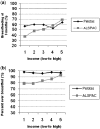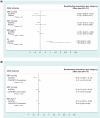What are the causal effects of breastfeeding on IQ, obesity and blood pressure? Evidence from comparing high-income with middle-income cohorts
- PMID: 21349903
- PMCID: PMC3147072
- DOI: 10.1093/ije/dyr020
What are the causal effects of breastfeeding on IQ, obesity and blood pressure? Evidence from comparing high-income with middle-income cohorts
Abstract
Background: A novel approach is explored for improving causal inference in observational studies by comparing cohorts from high-income with low- or middle-income countries (LMIC), where confounding structures differ. This is applied to assessing causal effects of breastfeeding on child blood pressure (BP), body mass index (BMI) and intelligence quotient (IQ).
Methods: Standardized approaches for assessing the confounding structure of breastfeeding by socio-economic position were applied to the British Avon Longitudinal Study of Parents and Children (ALSPAC) (N ≃ 5000) and Brazilian Pelotas 1993 cohorts (N ≃ 1000). This was used to improve causal inference regarding associations of breastfeeding with child BP, BMI and IQ. Analyses were extended to include results from a meta-analysis of five LMICs (N ≃ 10 000) and compared with a randomized trial of breastfeeding promotion. Findings Although higher socio-economic position was strongly associated with breastfeeding in ALSPAC, there was little such patterning in Pelotas. In ALSPAC, breastfeeding was associated with lower BP, lower BMI and higher IQ, adjusted for confounders, but in the directions expected if due to socioeconomic patterning. In contrast, in Pelotas, breastfeeding was not strongly associated with BP or BMI but was associated with higher IQ. Differences in associations observed between ALSPAC and the LMIC meta-analysis were in line with those observed between ALSPAC and Pelotas, but with robust evidence of heterogeneity detected between ALSPAC and the LMIC meta-analysis associations. Trial data supported the conclusions inferred by the cross-cohort comparisons, which provided evidence for causal effects on IQ but not for BP or BMI.
Conclusion: While reported associations of breastfeeding with child BP and BMI are likely to reflect residual confounding, breastfeeding may have causal effects on IQ. Comparing associations between populations with differing confounding structures can be used to improve causal inference in observational studies.
Figures


Comment in
-
Commentary: breastfeeding and obesity--the 2011 Scorecard.Int J Epidemiol. 2011 Jun;40(3):681-4. doi: 10.1093/ije/dyr085. Epub 2011 Jun 11. Int J Epidemiol. 2011. PMID: 21666265 Free PMC article. No abstract available.
References
-
- Lawlor DA, Davey Smith G, Kundu D, Bruckdorfer KR, Ebrahim S. Those confounded vitamins: what can we learn from the differences between observational versus randomised trial evidence? Lancet. 2004;363:1724–27. - PubMed
-
- Davey Smith G. Assessing intrauterine influences on offspring health outcomes: can epidemiological studies yield robust findings? Basic Clin Pharmacol Toxicol. 2008;102:245–56. - PubMed
-
- Rutter M. Epidemiological methods to tackle causal questions. Int J Epidemiol. 2009;38:3–6. - PubMed
-
- Dabelea D, Hanson RL, Lindsay RS, et al. Intrauterine exposure to diabetes conveys risks for type 2 diabetes and obesity: a study of discordant sibships. Diabetes. 2000;49:2208–11. - PubMed

